India: Kashmir lockdown blocks media, silences critical reporting

Communication in and out of the Indian region of Jammu and Kashmir has been blocked since August 4 following changes to the region’s autonomy in India’s Constitution. The International Federation of Journalists (IFJ) and its affiliate the Indian Journalist Union (IJU) have strongly criticized the restrictions imposed the media under the unprecedented lockdown and called on the authorities to guarantee the media’s access to information and right to work.
In early August, Indian Prime Minister, Narendra Modi, used a presidential order to repeal Article 370 and 35a of the Indian Constitution, stripping Jammu and Kashmir of its special autonomy. In the following days mobile, landline and the internet were cut off in the region, two political leaders were placed under house arrest and according to BBC, Vox, Reuters at least 500 activists, politicians and leaders have been arrested.
In addition to the communication block, a significant increase in military personnel were deployed in the region. Road blocks and a curfew have also been installed, creating what many have described as a ghost town.
According to a report by the Indian Express the press isn’t welcome. “Most of the TV crew that have flown in are parked in a 1-sq-km area of Zero Bridge in the city.”
IJU Secretary General and IFJ Vice President Sabina Inderjit said: “This gag on press freedom is antithesis of a democracy and demanded that the Union Home Ministry and local administration make arrangements that the media establishments are allowed to carry out their duties and that journalists are immediately issued curfew passes to report from the ground.”
The IFJ said: “We stand in solidarity with our colleagues in Kashmir who are simply trying to do their job in trying circumstances. Access to information is a human right, not something to be controlled by the government in an attempt to control the narrative. We demand that all communication is restored in the region, and guarantees are made to ensure the media are free to do their work.”
Source;IFJ
